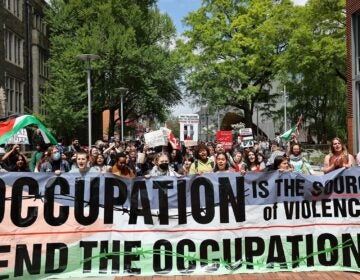Construction begins on Chestnut Hill meetinghouse and Turrell Skyspace
Construction has started on a Philadelphia Quaker meetinghouse that will feature a James Turrell Skyspace. The worship space at 20 East Mermaid Lane in Chestnut Hill will feature an aperture in the ceiling that opens to the sky. The light installation lets in skylight within an enclosed chamber for deeply contemplative viewing. It opens a via a retractable roof which allows it to be closed during inclement weather such as rain.
John Howard, project manager for the Chestnut Hill Friends Meeting (CHFM), says construction should only take about eight months. “It’s not a big building and it’s a fairly simple building, keeping with the Quaker way,” he stated.
Turrell’s site-specific art installations complement the Quaker concept of Inner Light. “Quakers don’t usually proselytize,” but the Skyspace may function as an indirect way of doing so, Howard said. He believes the Skyspace will attract a lot of new people to Quakerism.
Another key feature in the project is a commitment to green building techniques and environmental conservation, particularly in regards to storm water management. The new meetinghouse is being built because CHFM has outgrown its current meetinghouse located just two lots away, at 100 East Mermaid Lane.
Construction Timeline
Crews will soon clear the lot and install a state-of-the-art storm water management system. This will require tearing up asphalt from what was once the parking lot of the Yarnall Waring Company factory. Crews will then dig a hole for the meetinghouse basement as well those for the storm water retainment basins.
The two basins are a critical feature in the future meetinghouse’s storm water retention system. The design will enable run-off from the building’s roof top as well as its parking lot to be collected. The idea is to retain storm water surge and then release the water slowly so it doesn’t overwhelm the city sewer system. The run-off will first travel through a series of landscaped rain gardens comprised of native plantings and “lots of different types of grasses”, Howard explained. These gardens will help to purify the water of pollutants. The water flows next through a network of pipeline to the two subterranean storage basins to be discharged slowly and gently into the Wissahickon watershed.
The design should greatly reduce the problem of “chronic flooding” of the neighborhood’s Cresheim Creek, Howard asserted.
Stage two in the construction process will involve putting in the building foundation and doing structural work. The meeting room structure will have a steel frame to support the 20 by 35 foot retractable Skyspace roof. It will slide open to the sky above by way of an electric motorized rails. This part of the construction process should be finished after four months.
The final stage will be to fit out the building’s interior and should take three months to complete. Howard said that rather than take high tech energy approaches to heating and cooling, such as the use of geothermal heating, CHFM will be using a “highly controllable system” featuring “lots of little units” that they can use at their discretion. Rooms not in use can have have heating and cooling turned off as need be. Howard said computerized models show that it “makes more sense to save energy this way.”
The Skyspace, which exposes the meeting room to the elements, will be open for two hours at both dawn and dusk. During these times, the heating will be turned off. In the winter it will likely be quite cold.
CHFM expects the meeting house to meet the platinum level of Leadership in Environmental Energy and Design (LEED). The Quakers are opting to forgo the official certification, however, to save the $30-thousand involved in the certification process.
Howard sees the project as more more example of how the city leads in eco-conscious development. He noted that a lot of folks tend to dismiss this fact. “Philadelphia is very progressive,” Howard declared.
The new CHFM meetinghouse is anticipated to be completed by late spring of 2013.
WHYY is your source for fact-based, in-depth journalism and information. As a nonprofit organization, we rely on financial support from readers like you. Please give today.




